Top 30 Most Popular Fables and Lesson You Should Read For Kids
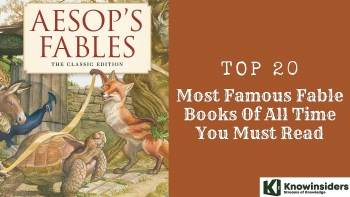 Top 20 Most Popular Fable Books in the World of All Time That You Must Read Top 20 Most Popular Fable Books in the World of All Time That You Must Read |
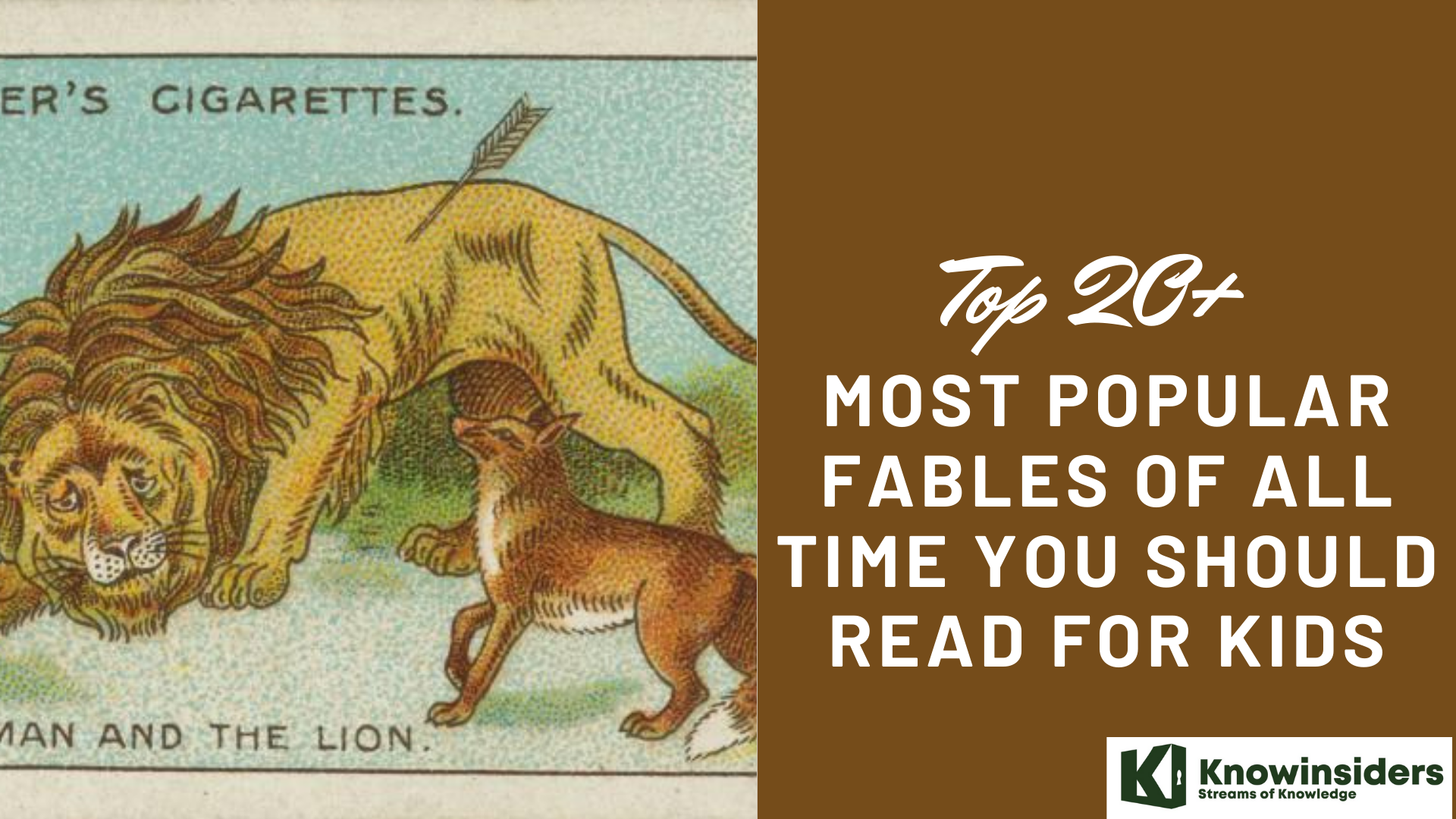 |
| Top 20+ Most Popular Fables Of All Time You Should Read For Kids |
What is a Fable?
Fables are made-up tales that teach the reader particular moral lessons. As long as they convey a lesson, fables can be either prose or poetry. Fables typically include animals as the main characters, however occasionally other objects—such as living domestic items or elements of the natural world—will be included.
No matter what kinds of entities are chosen as the main protagonists, they all have anthropomorphic traits that cause them to behave and think like people.
Difference Between Fable and Parable
Fable vs. Parable: Moral lessons are communicated through both fables and parables. You should be aware of some peculiarities, though. Most significantly, fables convey teachings through the anthropomorphic creatures whereas parables provide moral lessons through human people. Parables frequently originate in religious teachings. For instance, the majority of parables that are known to people today have their roots in the Bible.
The Bible's story of the Rich Man and Lazarus serves as an illustration of a parable. This tale employs people to convey the message that helping the less fortunate and practicing charity are vital. This is shown by the fact that Lazarus was admitted into Heaven whereas the rich man was consigned to Hell for his failure to show mercy to Lazarus. The good deeds were rewarded and the wicked deeds were punished, much like in a fable, but this was accomplished through a religious tale with human characters.
The Purpose of Fables
Moral lessons are primarily intended to be taught through stories. With their use of fantasy and amusing human-like figures, fables are typically written with children in mind. Fables can serve as teaching tools for young audiences by providing illustrations of how good deeds are rewarded and bad deeds are severely punished.
Fables offer viewers the ability to laugh at the struggles of the human condition more broadly. Fables occasionally also function as satire and critique that call attention to more serious issues affecting society, culture, or humanity.
Read More: Top 20+ World's Best Fairy Tale Books Of All Time For Kids
What Are The Most Popular Fables Of All Time You Should Read For Kids?
1. The Fox & the Grapes
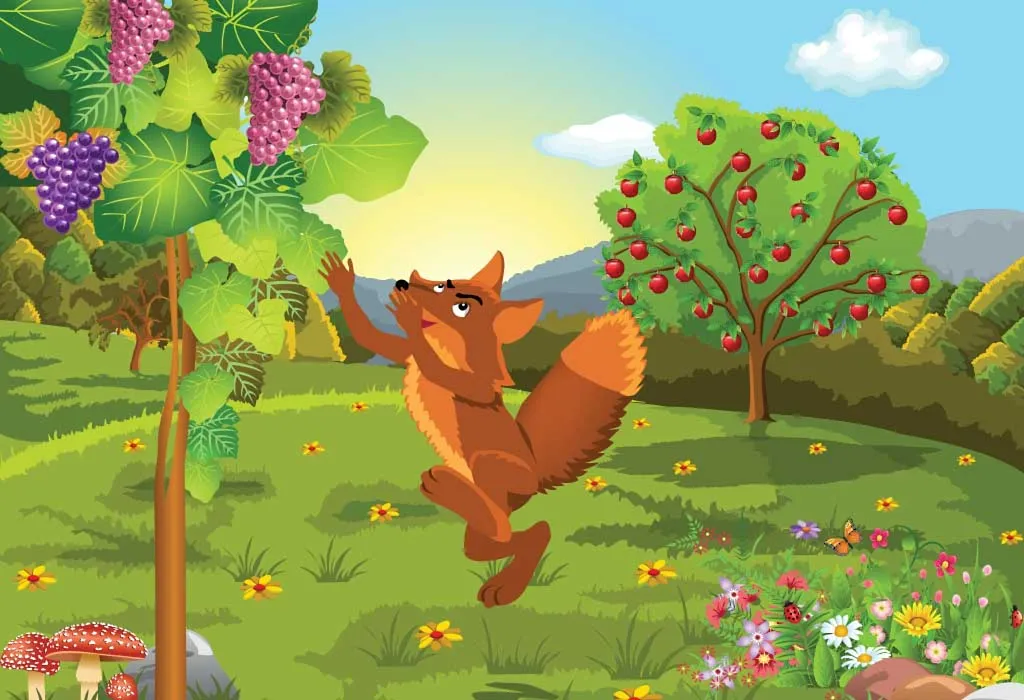 |
| Photo: FirstCry Parenting |
A Fox one day spied a beautiful bunch of ripe grapes hanging from a vine trained along the branches of a tree. The grapes seemed ready to burst with juice, and the Fox's mouth watered as he gazed longingly at them.
The bunch hung from a high branch, and the Fox had to jump for it. The first time he jumped he missed it by a long way. So he walked off a short distance and took a running leap at it, only to fall short once more. Again and again he tried, but in vain.
Now he sat down and looked at the grapes in disgust.
"What a fool I am," he said. "Here I am wearing myself out to get a bunch of sour grapes that are not worth gaping for."
And off he walked very, very scornfully.
One of Aesop's most well-known fables in the literary world is probably "The Fox and the Grapes." Actually, the premise of this tale is what gave rise to the English term "sour grapes"! We all now understand the context in which this expression is employed. These two terms are frequently used to describe the circumstance in which a person becomes indifferent toward a desire as a result of his or her inability or ineptitude to make the want a reality. It is simple to hate what you cannot have, as the story's famous lesson goes.
This fable was originally written in Greek by Demetrius of Phalerum, along with the rest of Aesop's tales. Then, in the first century, Phaedrus translated it into Latin. These fables, often known as La Fontaine's Fables, were translated into French by Jean de La Fontaine in the late 17th century. Even before the birth of Christ, these tales were spreading across cultures.
2. The Fox And The Hedgehog
 |
| Photo: Hedgehog Digital |
A fox, after crossing a river, got its tail entangled in a bush, and couldn’t move. A number of mosquitoes, upon seeing the fox trapped, settled upon him and enjoyed a good meal, feasting upon the fox’s blood, the fox unable to swish them away with his trapped tail. A hedgehog that was strolling by took pity on the fox and went up to him.
‘You are in a bad way, neighbour,’ said the hedgehog; ‘shall I help you out by driving off those mosquitoes who are sucking your blood?’ ‘Thank you, Master Hedgehog,’ said the fox, ‘but I would rather you didn’t.’ ‘Why not?’ asked the hedgehog. ‘Well, you see,’ the fox replied, ‘these mosquitoes have had their fill; if you drive these away, others will come with fresh appetite and bleed me to death.’
3. The Milkmaid and Her Pail
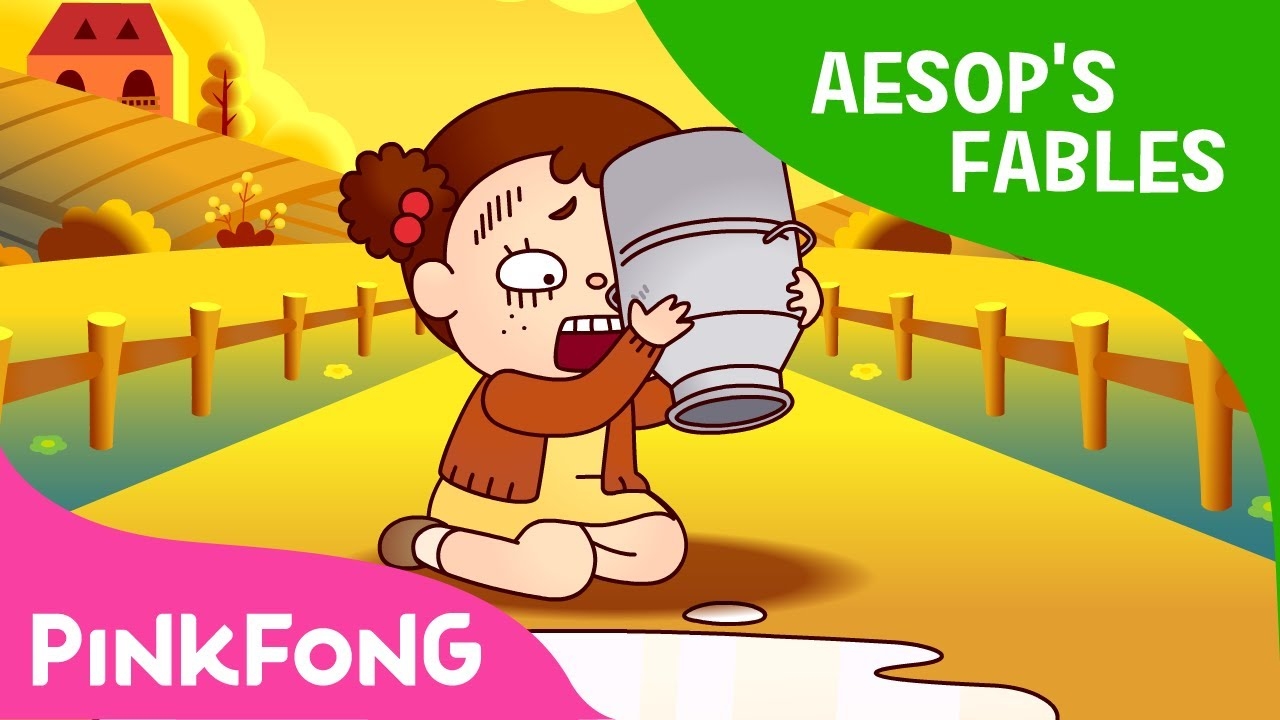 |
| Photo: Pinkfong Baby Shark |
A Milkmaid had been out to milk the cows and was returning from the field with the shining milk pail balanced nicely on her head. As she walked along, her pretty head was busy with plans for the days to come.
“This good, rich milk,” she mused, “will give me plenty of cream to churn. The butter I make I will take to market, and with the money I get for it I will buy a lot of eggs for hatching. How nice it will be when they are all hatched and the yard is full of fine young chicks. Then when May day comes I will sell them, and with the money I’ll buy a lovely new dress to wear to the fair. All the young men will look at me. They will come and try to make love to me,—but I shall very quickly send them about their business!”
As she thought of how she would settle that matter, she tossed her head scornfully, and down fell the pail of milk to the ground. And all the milk flowed out, and with it vanished butter and eggs and chicks and new dress and all the milkmaid’s pride.
| Fables are effective at spreading moral lessons because they are straightforward and basic enough for all types of readers to understand. Although they are now frequently available in written versions, many fables were traditionally passed down orally from one generation to the next. Despite this, they are not difficult to retell verbally. |
4. The Wolf in Sheep’s Clothing
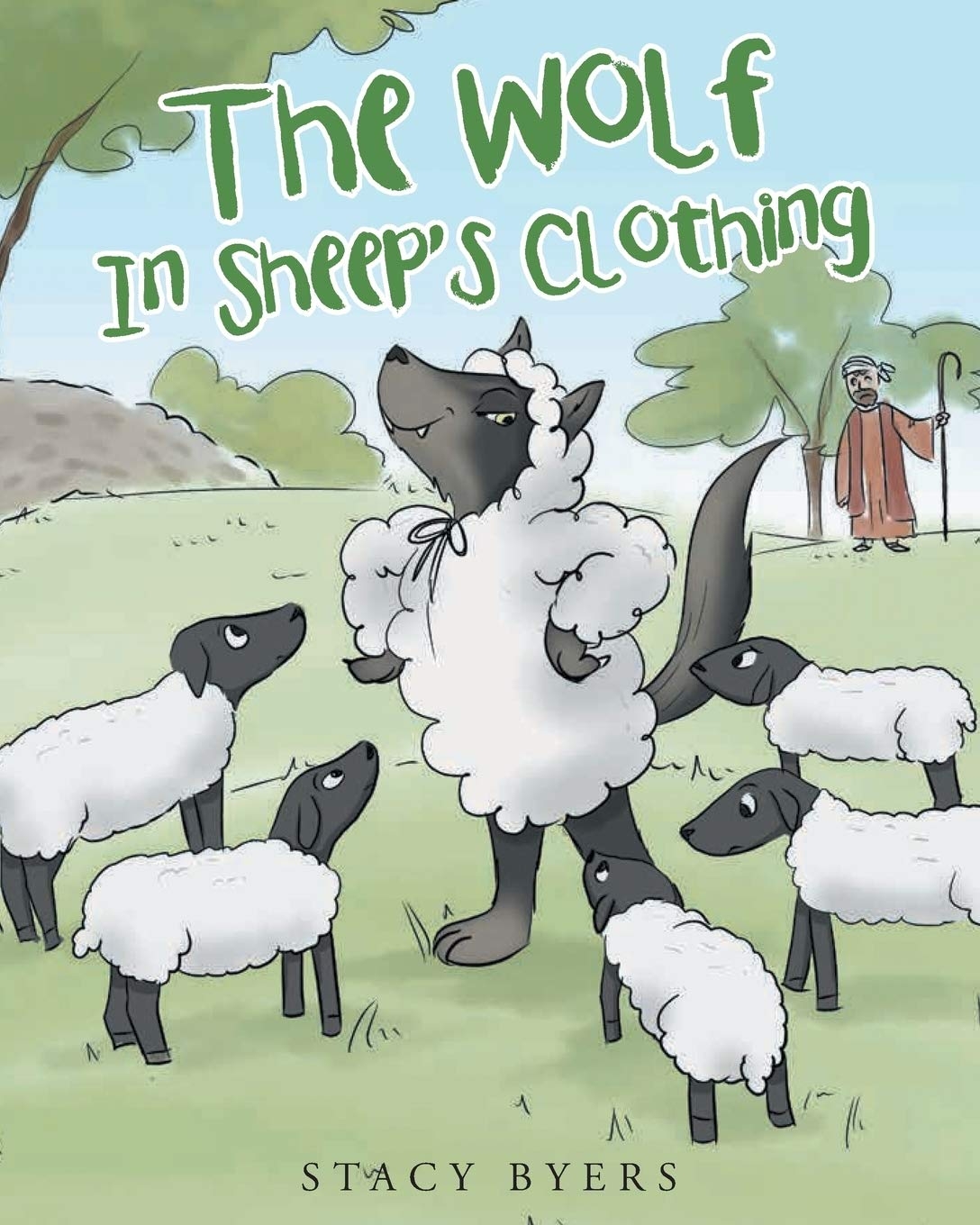 |
| Photo: Amazon.com |
A certain Wolf could not get enough to eat because of the watchfulness of the Shepherds. But one night he found a sheep skin that had been cast aside and forgotten. The next day, dressed in the skin, the Wolf strolled into the pasture with the Sheep. Soon a little Lamb was following him about and was quickly led away to slaughter.
That evening the Wolf entered the fold with the flock. But it happened that the Shepherd took a fancy for mutton broth that very evening, and, picking up a knife, went to the fold. There the first he laid hands on and killed was the Wolf.
Examples of Fables in LiteratureThe legends of the Chinese Zodiac have been passed down orally for thousands of years until being eventually written down and translated. In the narrative, the emperor chooses the sequence of the years depending on the arrival of the animals who would serve as his guardians. It is now thought that those born in the year associated with any given animal will possess the characteristics of that animal and how it came to rule the emperor. In George Orwell's political novella Animal Farm, the animals, who resemble humans, overthrow the actual human farm owners in order to rule themselves. The narrative, however a particular kind of fable, tries to mock political revolution and how it frequently deviates from its original goals and messages to the populace. Of course, the most famous collection of fables is Aesop's Fables. A compilation of ancient tales with enduring relevance, Aesop's Fables illustrates communication problems and imparts life lessons. |
5. The Ant And The Grasshopper
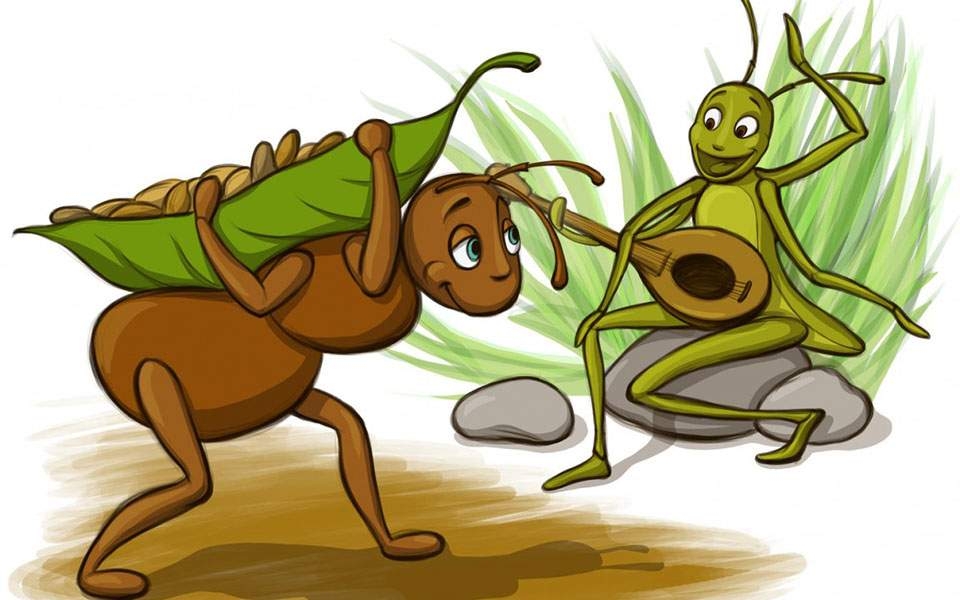 |
| Photo: Getty Images |
One bright day in late autumn a family of Ants were bustling about in the warm sunshine, drying out the grain they had stored up during the summer, when a starving Grasshopper, his fiddle under his arm, came up and humbly begged for a bite to eat.
"What!" cried the Ants in surprise, "haven't you stored anything away for the winter? What in the world were you doing all last summer?"
"I didn't have time to store up any food," whined the Grasshopper; "I was so busy making music that before I knew it the summer was gone."
The Ants shrugged their shoulders in disgust.
"Making music, were you?" they cried. "Very well; now dance!" And they turned their backs on the Grasshopper and went on with their work.
6. The Frogs Asking for a King
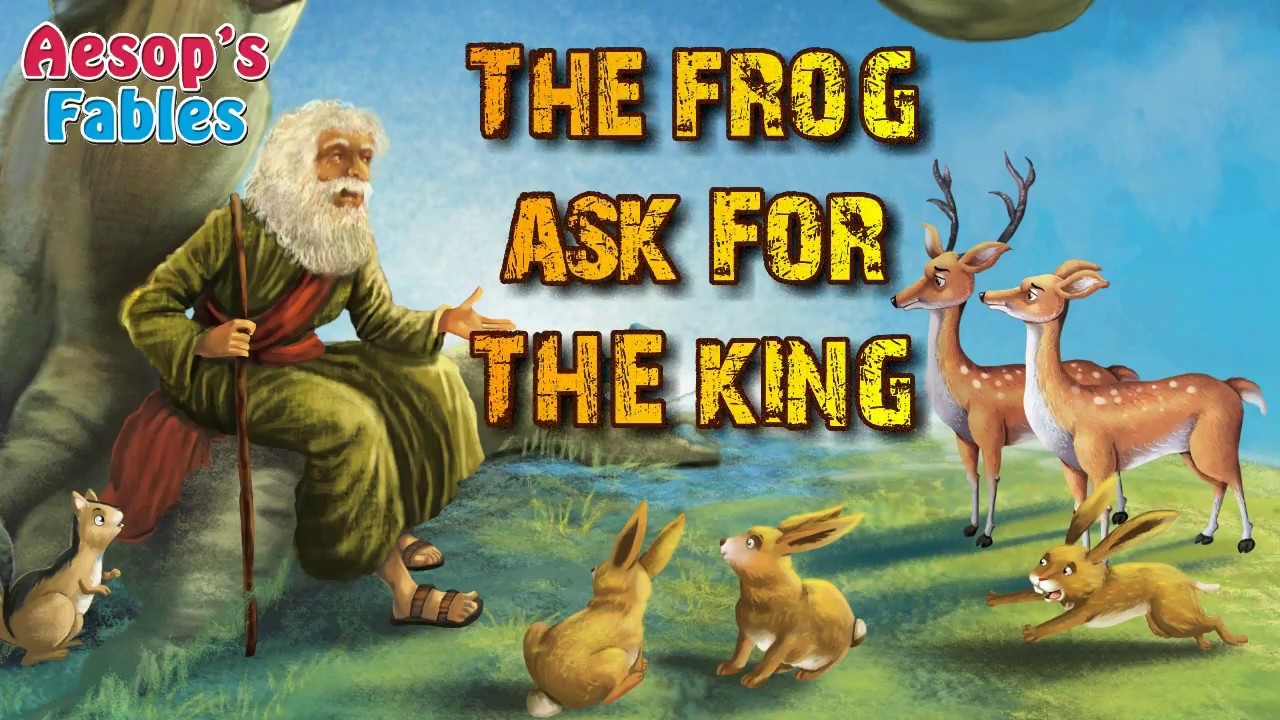 |
| Photo: ITOYS JUST KIDS ENGLISH |
Once upon a time, the Frogs were discontented because they had no one to rule over them: so they sent a deputation to Jupiter to ask him to give them a King. Jupiter, despising the folly of their request, cast a log into the pool where they lived, and said that the log should be their King. The Frogs were terrified at first by the splash, and scuttled away into the deepest parts of the pool; but gradually, when they saw that the log remained motionless, one by one they began to venture to the surface again, and before long, growing bolder, they began to feel such contempt for the log that they even took to sitting on it.
Thinking that a King of that sort was an insult to their dignity, they sent to Jupiter a second time, and begged him to take away the sluggish King he had given them, and to give them another and a better one. Jupiter, annoyed at being pestered in this way, sent a Stork to rule over them. No sooner had the Stork arrived among them than he began to catch and eat the Frogs as fast as he could.
Lesson: What lesson may be learned from "The Frogs Asking for a King"? 'When you strive to modify your state, be sure that you can better it,' is one lesson that is frequently offered. Be careful who you vote for while casting your political ballots; someone may run.
7. The Goose & the Golden Egg
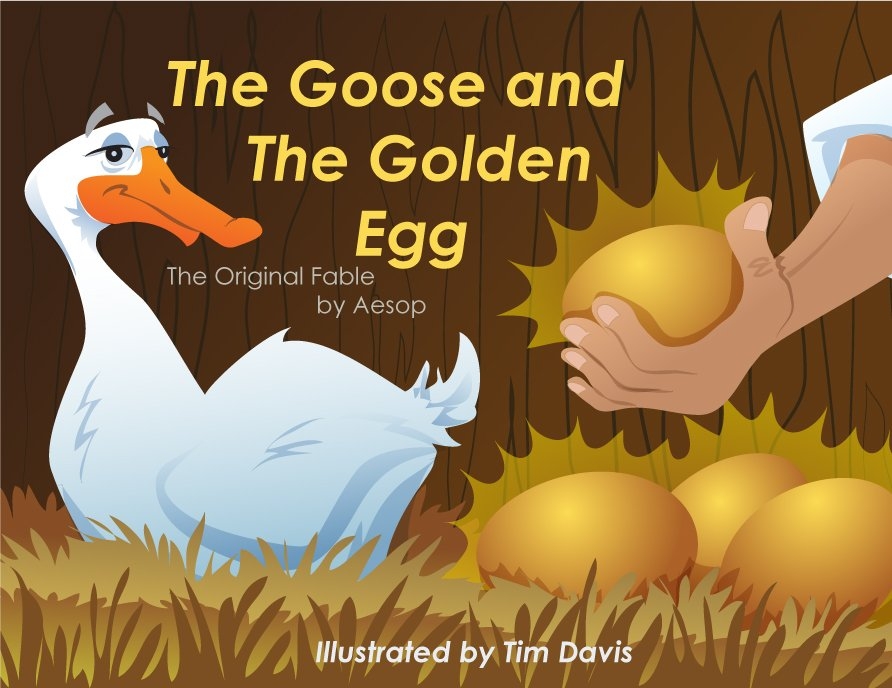 |
| Photo: Twitter |
There was once a Countryman who possessed the most wonderful Goose you can imagine, for every day when he visited the nest, the Goose had laid a beautiful, glittering, golden egg.
The Countryman took the eggs to market and soon began to get rich. But it was not long before he grew impatient with the Goose because she gave him only a single golden egg a day. He was not getting rich fast enough.
Then one day, after he had finished counting his money, the idea came to him that he could get all the golden eggs at once by killing the Goose and cutting it open. But when the deed was done, not a single golden egg did he find, and his precious Goose was dead.
Lesson: Those who have plenty want more and so lose all they have.
8. The Hare and the Tortoise
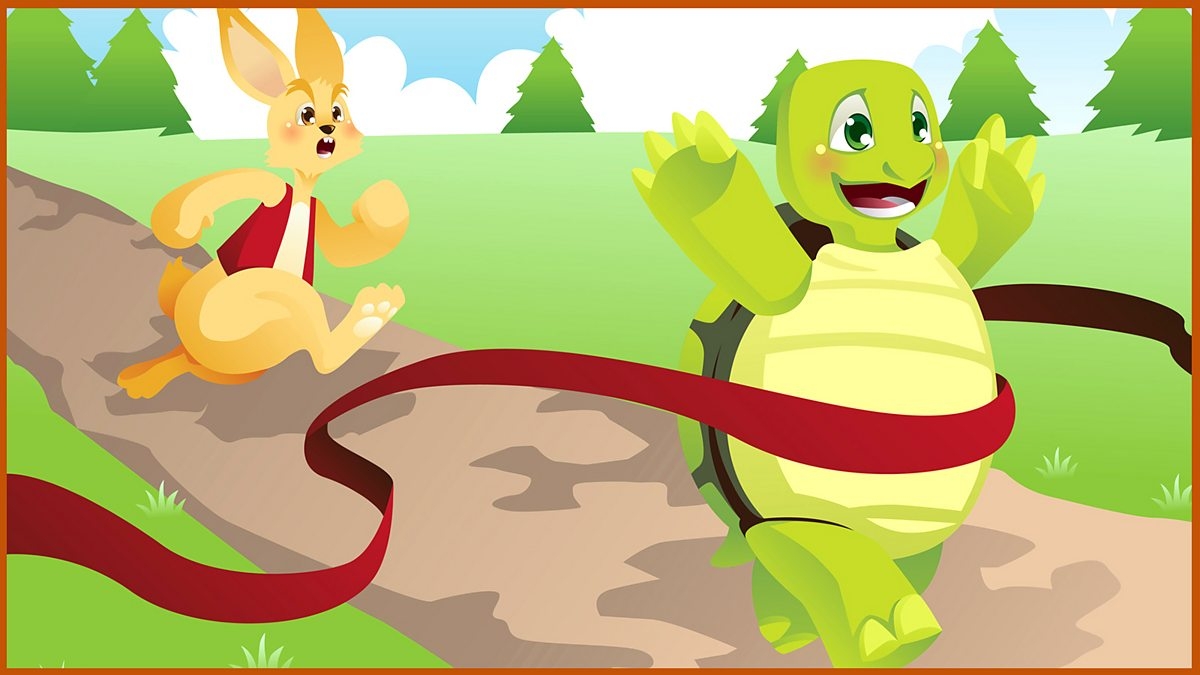 |
| Photo: BBC |
A Hare was making fun of the Tortoise one day for being so slow.
"Do you ever get anywhere?" he asked with a mocking laugh.
"Yes," replied the Tortoise, "and I get there sooner than you think. I'll run you a race and prove it."
The Hare was much amused at the idea of running a race with the Tortoise, but for the fun of the thing he agreed. So the Fox, who had consented to act as judge, marked the distance and started the runners off.
The Hare was soon far out of sight, and to make the Tortoise feel very deeply how ridiculous it was for him to try a race with a Hare, he lay down beside the course to take a nap until the Tortoise should catch up.
The Tortoise meanwhile kept going slowly but steadily, and, after a time, passed the place where the Hare was sleeping. But the Hare slept on very peacefully; and when at last he did wake up, the Tortoise was near the goal. The Hare now ran his swiftest, but he could not overtake the Tortoise in time.
Lesson: The race is not always to the swift.
9. The Horse And The Donkey
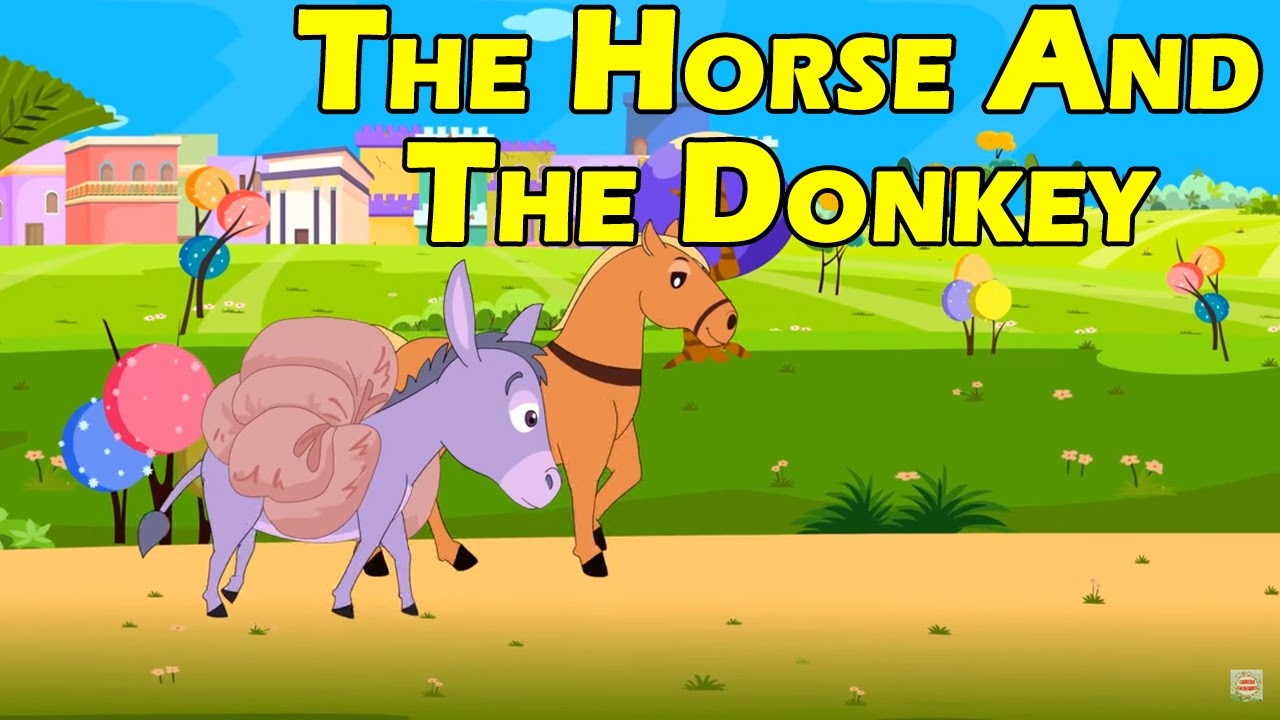 |
| Photo: Youtube |
Once upon a time, there lived a washerman. He washed people’s clothes for money. He had a horse and a donkey. One day, the washerman had loaded his donkey with the heavy bundle of clean clothes, while the horse carried nothing. The load on the donkey was very heavy.
After some time, he decided to ask for help from the horse. So, he requested the horse, “Brother! The load is killing me. Please, will you share some of it?” The horse said, “Why should I? We horses are meant for riding and you donkeys are meant for carrying heavy loads.”
The donkey kept walking for a long while. Eventually, the donkey fell down exhausted by the heavy load. Then, the washerman realized his mistake. He gave water to the donkey and transferred the entire load of clothes onto the horse’s back.
The horse thought to himself, “I should have listened to the donkey and accepted the half of the load. Now, I will have to carry the entire load to the market!” The horse carried the load for the rest of the distance. He promised himself to always help those who are in need. Now, the horse and the donkey are best of friends and also, they share their work.
LESSON: ALWAYS BE FRIENDLY TO OTHERS AND HELP THEM IN THEIR NEED.
10. The Lion & the Mouse
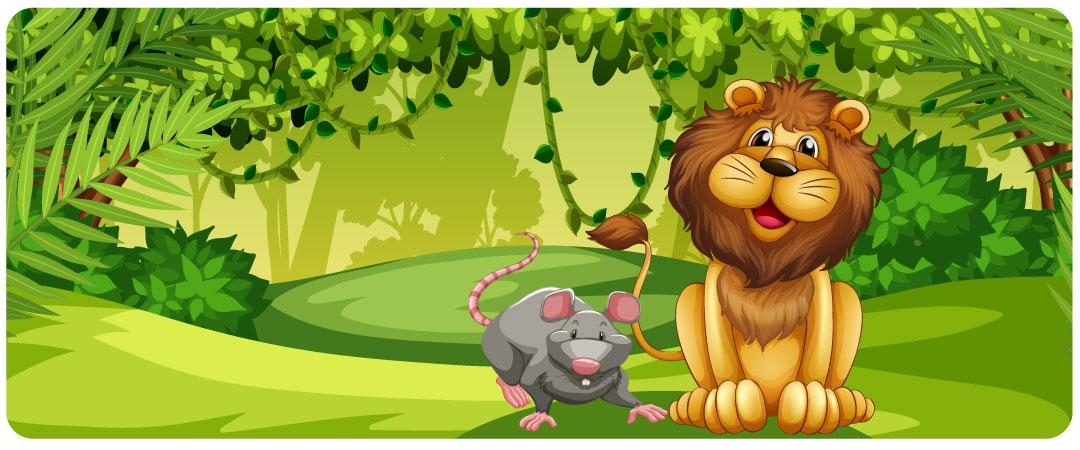 |
| Photo: BJYU's |
A Lion lay asleep in the forest, his great head resting on his paws. A timid little Mouse came upon him unexpectedly, and in her fright and haste to get away, ran across the Lion's nose. Roused from his nap, the Lion laid his huge paw angrily on the tiny creature to kill her.
"Spare me!" begged the poor Mouse. "Please let me go and some day I will surely repay you."
The Lion was much amused to think that a Mouse could ever help him. But he was generous and finally let the Mouse go.
Some days later, while stalking his prey in the forest, the Lion was caught in the toils of a hunter's net. Unable to free himself, he filled the forest with his angry roaring. The Mouse knew the voice and quickly found the Lion struggling in the net. Running to one of the great ropes that bound him, she gnawed it until it parted, and soon the Lion was free.
"You laughed when I said I would repay you," said the Mouse. "Now you see that even a Mouse can help a Lion."
Lesson: A kindness is never wasted.
11. The Wind and the Sun
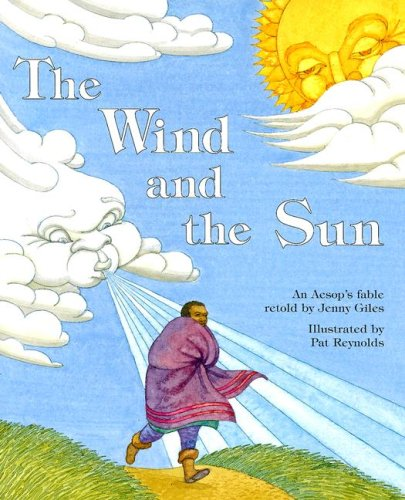 |
| Photo: Amazon.com |
There was once an argument between the wind and the sun about who was stronger than the other. They argued for a long time but neither of them emerged the winner. It wasn’t too long before they spotted a man walking on the road. Looking at the man wearing a coat, an idea struck them both.
They challenged each other that the one who succeeded in removing the coat from the man’s back was the strongest.
The wind volunteered to try first. It began to blow hard, raising gusts of air and making it harder for the man to take a step further.
But, the man clutched his coat tight around him and resumed walking with great difficulty.
The wind continued blowing harder and harder, but the man held on to his coat tighter and tighter. And continued his journey forward. Finally, the wind was exhausted and gave up. His efforts had been futile.
****
It was now the turn of the sun. He looked at the man and began to gently shine upon the path the man was walking on.
The man looked up at the sky – surprised at the change in weather.
The sun did not spend much energy, neither did he apply any effort. He just continued shining upon the man’s head gently.
Soon the man was huffing and puffing, and sweating profusely.
Unable to bear the rising heat, the man finally took off his coat and headed to a nearby tree to rest for a while under its shade.
Lesson: Sometimes gentle persuasion is mightier than the strongest force.
 Top 500+ Meaningful and Inspirational Wishes, Quotes for Kids Of All Ages Top 500+ Meaningful and Inspirational Wishes, Quotes for Kids Of All Ages |
12. The Boy Who Cried Wolf
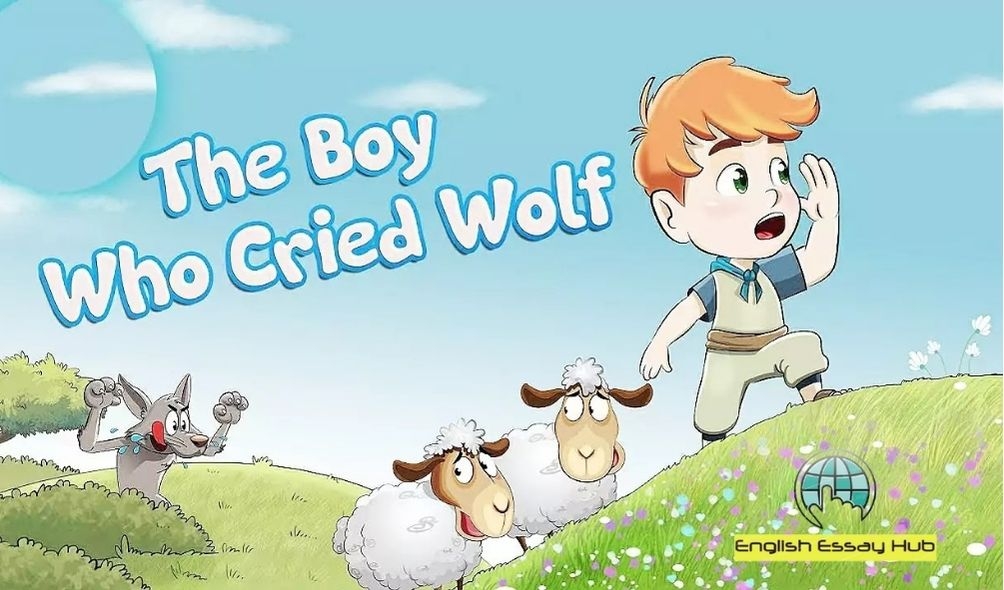 |
| Photo: English Essay Club |
Once there was a boy who kept sheep. Every morning, he would take his sheep and head out to the pastures just outside the village. The sheep would graze there and the boy would idle his time in the shade of an apple tree.
Often, when he would get bored of snoring under the tree, or eating apples from it, he would climb up to the top of the tree and call out in a loud voice, “Wolf! Wolf!”
The villagers would drop everything they were doing. And they would run to the pastures to help the boy save his sheep from the wolf’s sharp teeth. Once they arrived there, the boy would laugh and call out, “Tricked you!” The wicked, little boy would play this joke everyday until one day, the villagers got tired of him and decided to ignore him in the future.
One day, as the boy sat eating apples on one of the branches of the tree, a wolf did come into the pasture. The wolf saw the large herd of sheep and jumped right into the midst of it.
The boy shouted in fear, “Wolf! Wolf!”
The villagers heard his cries and nodded to each other.
“There goes the boy with his pranks again”, said one villager.
“Oh! But we will not be tricked by him again, will we?!” replied another.
The villagers went about their work as usual, ignoring the boy’s cries.
The boy saw the wolf eat up his sheep. He ran to the villagers calling them to come and help him. But the villagers just scowled at him and went about their business.
The boy ran back to the pasture. But the wolf had already killed most of his sheep, finishing a hearty meal.
Lesson: One seldom believes a liar, even when he is telling the truth.
13. The Ass and The Mule
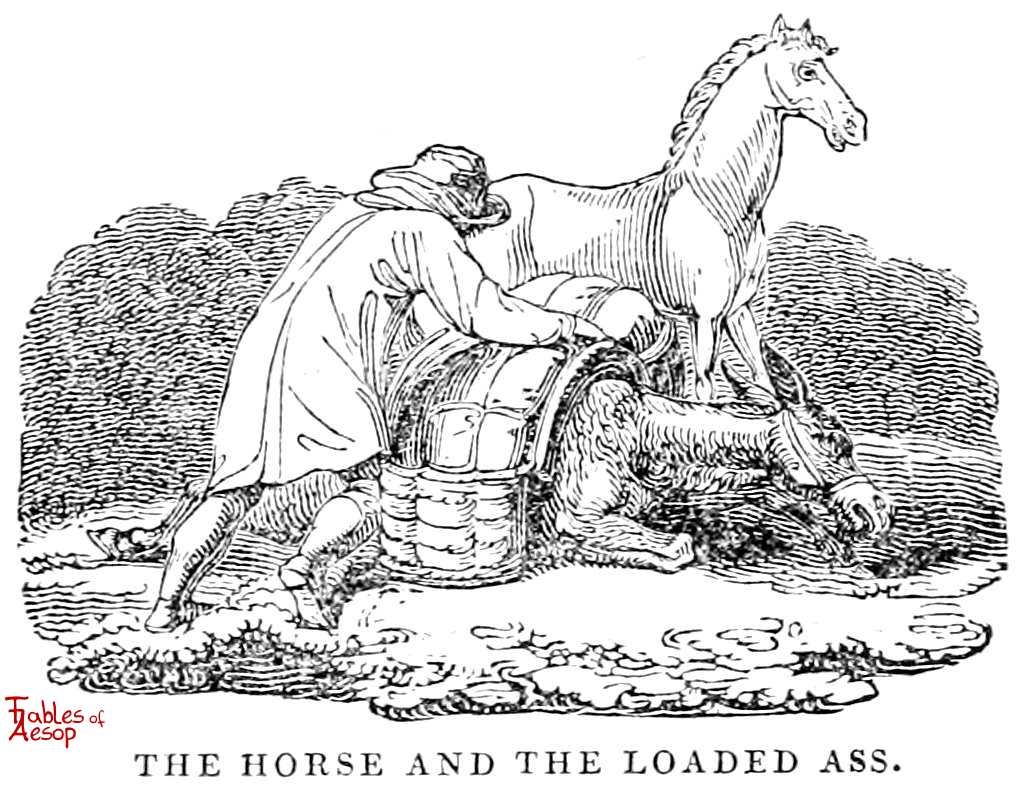 |
| Photo: Fables of Aesop |
A Muleteer set forth on a journey along with his ass and mule, both laden with provisions for the journey and wares. The ass traveled the plains with ease, carrying his burden happily. But when they began to ascend the steep paths of the mountains, he felt unable to bear the load.
He requested his companion, the mule, to relieve him of a small portion of his burden, but the mule paid no attention to his entreaties. The ass soon fell down dead under the load.
Not seeing anyone around, the muleteer skinned the ass, and placed its hide, along with the load it was carrying on the mule’s back.
The mule, groaning under the heavy load, said to himself, “I have got what I deserved. If only I had been willing to help the ass in his need, I would not be bearing this additional burden and would also have a companion.
Lesson: Prevention is indeed, better than cure.”
14. The Lamb and The Wolf
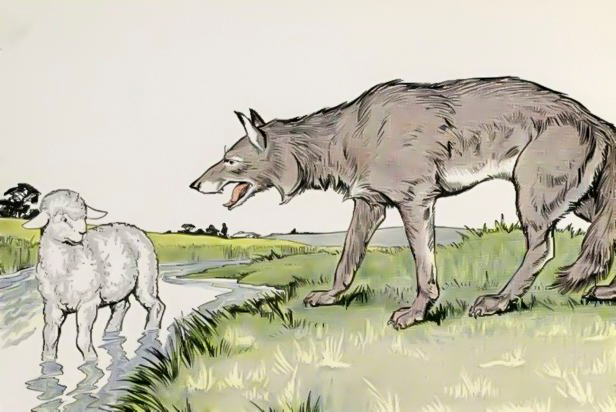 |
| Photo: Fables of Aesop |
A lamb was returning alone from the pasture. Seeing him unprotected, a wolf started following him with the intent of eating him. The lamb realized that he could not escape. He turned around to face the wolf and said, “I know, friend wolf, that I must be your prey. But before I die, I would ask one favor of you. Will you play a tune so I may dance.”
The wolf complied and started playing. The lamb started dancing. Some hounds heard the sound of the pipe and ran up to the wolf and started chasing him.
The wolf realized he had been tricked. Turning to the lamb, he said, “I have got what I deserve. For I, who am only a butcher should not have turned piper to please you.”
Lesson: “In time of dire need, clever thinking is key”.
15. The Crow and The Fox
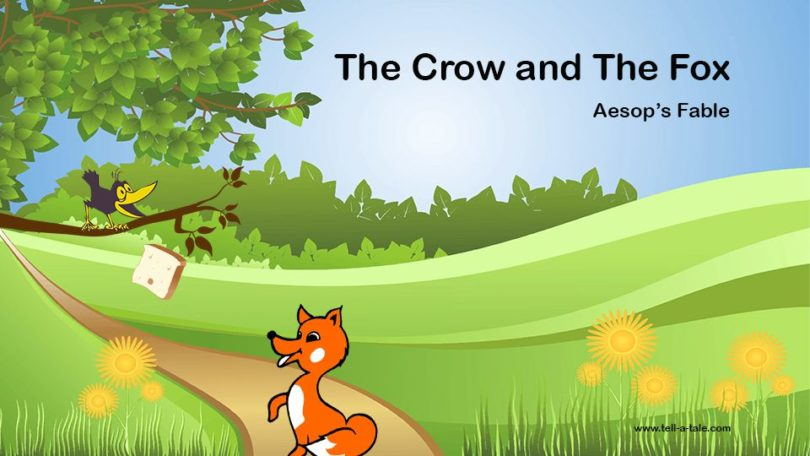 |
| Photo: Tell A Tale |
Once a big, black hungry crow was flying around looking for food. He came across a big piece of bread lying on the ground and picked it up in his beak. He then flew to a tree nearby and perched on its branch. He looked forward to eating the bread.
A fox passing by, saw the crow perched on the tree with the bread in his beak.
The fox thought to himself, “Mmmmm. That bread looks so tasty. I have to find a way to get it from the crow.”
The fox walked up to the tree and said, “Oh crow, you are looking so handsome today. Your feathers are so glossy and sparkling. You look like the king of the birds. I am sure your voice is as majestic as your presence.”
The crow was pleased to hear his praise. But he could not say a word because of the bread in his beak.
The fox continued, “Oh king of the birds! Do let me have the pleasure of hearing you sing. I will be the most blessed fox.”
The crow, who had never heard such praise, could no longer control himself.
He stretched his neck, raised his head to the sky and began to caw loudly.
And…
Down fell the bread right into the waiting fox’s mouth.
The crow was left cawing while the fox gobbled up the bread.
Lesson: Beware of flattery.
16. The Ant and The Dove
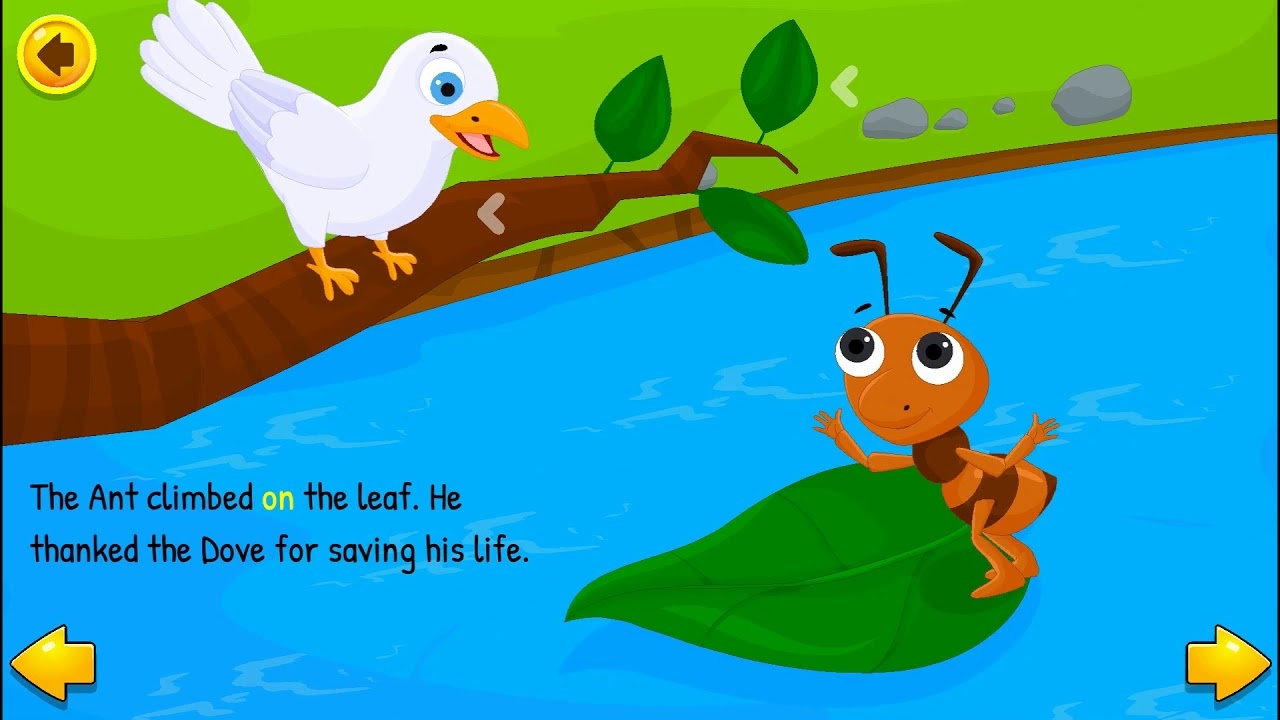 |
| Photo: BooBoo |
Once an ant was drinking water at the bank of a river. Suddenly a huge wave lapped at him and he fell into the water. The tiny could not swim against the strong current and reach the shore.
A dove sitting in a tree near the river bank saw the ant struggling in the water. The dove plucked a leaf from the tree, flew over to where the ant was and threw the leaf into the water.
The ant climbed on to the leaf and floated safely to the river bank.
Shortly afterwards, a bird-catcher came to the river to catch birds. He laid out a net and started spreading twigs and grains on the net.
The ant watched the bird-catcher and understood his intentions. He crawled up to the bird-catcher and stung him the foot.
The bird-catcher cried out loudly in pain. The dove heard the bird-catcher and flew away to safety.
Lesson: A good deed never goes unnoticed.
17. The Bowman and The Lion
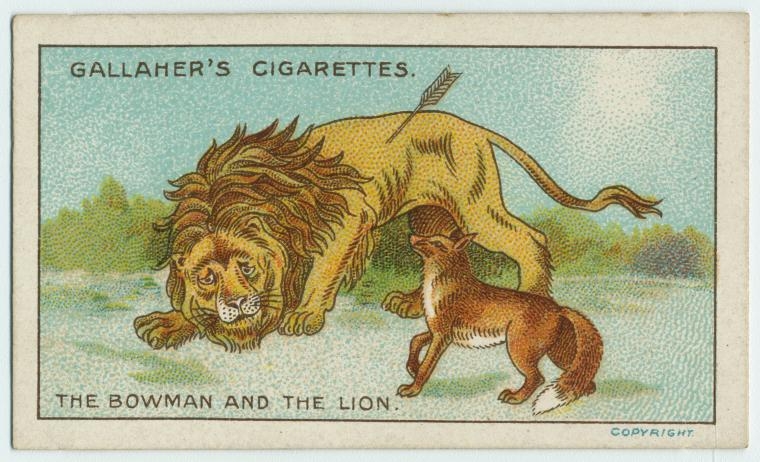 |
| Photo: Gallaher, Gallaher's Cigarettes |
Once a huntsman went into the forest with his bow and arrow looking for game.
All the beasts and birds of the animals saw the weapon in his hands and fled at his sight. The lion, however, told the animals not to be afraid as he would challenge the huntsman.
He stood in front of the huntsman and prepared to attack him.
The huntsman, however, took out an arrow from his quiver and shot it into the lion’s side, with the message, “I sent to you my messenger. From him you may learn what I will be like when I attack you.”
The lion ran back into the forest. The fox who had seen all this happen, encouraged the lion to not give up.
The lion responded, “You counsel me in vain. For if the huntsman sends so fearful a messenger, how will I ever withstand an attack by the man himself?”
Lesson: Always be careful of the enemy who attacks from a distance.
18. The nightingale
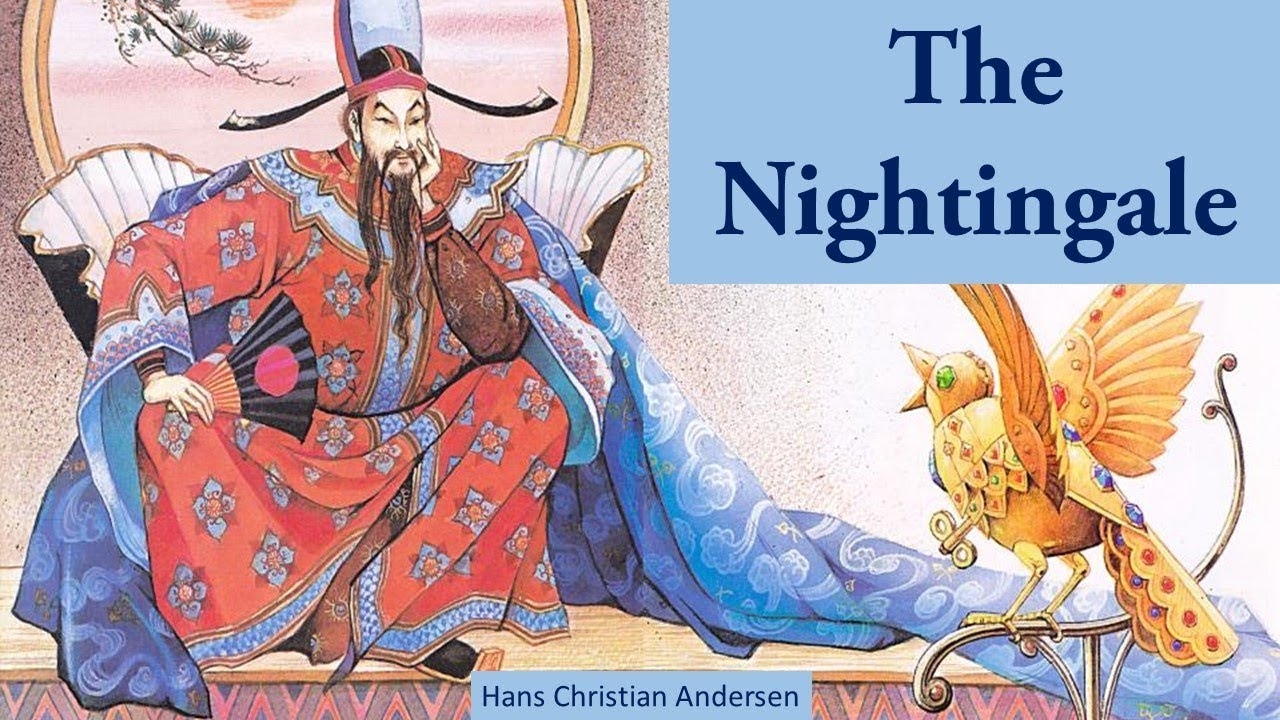 |
| Photo: talesandbedtimestories |
One day a nobleman caught a nightingale and wanted to put it in a cage. But the bird spoke to him:
- Let me go and I will give you a good advice. It may be of use to you some day.
The rich man agreed to let it go.
The nightingale gave him these advices:
- Never be sorry for something that cannot be brought back, my lord. And never trust idle words.
The nobleman heard the advises and let the nightingale go. The bird flew out and said:
- Too bad you let me go. If only you knew about my treasure. I have a huge very expensive gem under my wing. If you had taken it, you would become even richer.
When he heard that, the nobleman began to regret letting bitterly about the bird go, jumped up and tried to catch it.
The nightingale turned towards him and said:
- Now I know, master, that you are a greedy and foolish man: you were sorry for something that cannot be brought back. And you believed my idle words! Look at what a little bird I am. How could I be hiding a large gem under my wing?
And after these words the bird flew away.
19. The two brothers and the white-bearded old man
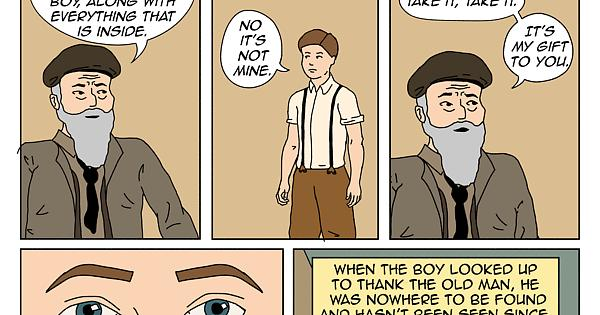 |
| Photo: Imgur |
Once upon a time there were two brothers. They decided to start venturing from town to town and from village to village to to seek happiness. Along the way they saw an old man with white beard heading towards them.
The old man stopped and asked the boys where they were headed. When he found out he told them:
"I want to help you." He put his hand in his pocket and pulled out a handful of golden coins. " Which one of you wants these?" he asked.
"I want them." replied the big brother immediately. The old man hand in his other pocket and pulled out a precious gem, shining like the sun, and asked again:
"Which one of you want to have the gem?
"I want it." hasty answered the big brother and the old man gave him the gem. Then the old man put down the sack he was carrying on his back and said:
"Now who is gonna help me bring this sack to the village?"
The big brother said nothing. On the other hand the little brother pulled up his sleeves and bended down to help him. The old man smiled and said:
"Take it with you, my boy, along with everything that is inside."
"No it's not mine."
" Take it, take it." said the old man. "It's my gift to you."
The little brother opened the sack. And what did his eyes see? The bag was filled with precious gemstones. He stood up to thank the old man, but he was nowhere to be found.
20. The tale of the pointer tray
In a voyage which I made to the East Indies with Captain Hamilton, I took a favorite pointer with me; he was, to use a common phrase, worth his weight in gold, for he never deceived me. One day, when we were, by the best observations we could make, at least three hundred leagues from land, my dog pointed. I observed him for nearly an hour with astonishment, and mentioned the circumstance to the captain and every officer on board, asserting that we must be near land, for my dog smelt game. This occasioned a general laugh; but that did not alter in the least the good opinion I had of my dog. After much conversation pro and con, I boldly told the captain that I placed more confidence in Tray's nose than I did in the eyes of every seaman on board; and therefore boldly proposed laying the sum I had agreed to pay for my passage (viz., one hundred guineas) that we should find game within half an hour. The captain (a good hearty fellow) laughed again, desired Mr. Crawford, the surgeon, who was prepared, to feel my pulse. He did so, and reported me in perfect health. The following dialogue between them took place; I overheard it, though spoken low and at some distance:—
Captain. His brain is turned; I cannot with honor accept his wager.
Surgeon. I am of a different opinion. He is quite sane, and depends more upon the scent of his dog than he will upon the judgment of all the officers on board; he will certainly lose, and he richly merits it.
Captain. Such a wager cannot be fair on my side; however, I'll take him up, if I return his money afterwards.
During the above conversation, Tray continued in the same situation, and confirmed me still more in my opinion. I proposed the wager a second time; it was then accepted.
Done! and done! were scarcely said on both sides, when some sailors who were fishing in the long boat, which was made fast to the stern of the ship, harpooned an exceedingly large shark, which they brought on board and began to cut up for the purpose of barrelling the oil, when, behold, they found no less than SIX BRACE OF LIVE PARTRIDGES in this animal's stomach!
They had been so long in that situation, that one of the hens was sitting upon four eggs, and a fifth was hatching, when the shark was opened!
This young bird we brought up by placing it with a litter of kittens that came into the world a few minutes before. The old cat was as fond of it as any of her own four-legged progeny, and made herself very unhappy when it flew out of her reach till it returned again. As to the other partridges, there were four hens amongst them; one or more were, during the voyage, constantly sitting, and consequently we had plenty of game at the captain's table; and in gratitude to poor Tray (for being a means of winning one hundred guineas) I ordered him the bones daily, and sometimes a whole bird.
21. The Mischievous Dog
There was once a dog who used to snap at people and bite them without any provocation, and who was a great nuisance to everyone who came to his master's house. So his master fastened a bell round his neck to warn people of his presence. The dog was very proud of the bell and strutted about tinkling it with immense satisfaction. But an old dog came up to him and said, "The fewer airs you give yourself the better, my friend. You don't think, do you, that your bell was given you as a reward of merit? On the contrary, it is a badge of disgrace."
Lesson: Notoriety is often mistaken for fame.
22. The Charcoal-Burner and the Fuller
There was once a charcoal-burner who lived and worked by himself. A fuller, however, happened to come and settle in the same neighbourhood; and the charcoal-burner, having made his acquaintance and finding he was an agreeable sort of fellow, asked him if he would come and share his house: "We shall get to know one another better that way," he said, "and, besides, our household expenses will be diminished."
The fuller thanked him, but replied, "I couldn't think of it, sir: why, everything I take such pains to whiten would be blackened in no time by your charcoal."
23. The Mice In Council
Once on a time all the mice met together in council, and discussed the best means of securing themselves against the attacks of the cat.
After several suggestions had been debated, a mouse of some standing and experience got up and said, "I think I have hit upon a plan which will ensure our safety in the future, provided you approve and carry it out. It is that we should fasten a bell round the neck of our enemy the cat, which will by its tinkling warn us of her approach."
This proposal was warmly applauded, and it had been already decided to adopt it, when an old mouse got upon his feet and said, "I agree with you all that the plan before us is an admirable one: but may I ask who is going to bell the cat?"
24. The Bat and the Weasels
A bat fell to the ground and was caught by a weasel, and was just going to be killed and eaten when it begged to be let go. The weasel said he couldn't do that because he was an enemy of all birds on principle. "Oh, but," said the bat, "I'm not a bird at all: I'm a mouse."
"So you are," said the weasel, "now I come to look at you"; and he let it go.
Some time after this the bat was caught in just the same way by another weasel, and, as before, begged for its life. "No," said the weasel, "I never let a mouse go by any chance."
"But I'm not a mouse," said the bat; "I'm a bird."
"Why, so you are," said the weasel; and he too let the bat go.
Lesson: Look and see which way the wind blows before you commit yourself.
25. The Horse and the Groom
There was once a groom who used to spend long hours clipping and combing the horse of which he had charge, but who daily stole a portion of his allowance of oats, and sold it for his own profit. The horse gradually got into worse and worse condition, and at last cried to the groom, "If you really want me to look sleek and well, you must comb me less and feed me more."
26. The Peacock and the Crane
A peacock taunted a crane with the dullness of her plumage. "Look at my brilliant colours," said she, "and see how much finer they are than your poor feathers."
"I am not denying," replied the crane, "that yours are far more colourful than mine; but when it comes to flying I can soar into the clouds, whereas you are confined to the earth like any dunghill cock."
27. The Cat and the Birds
A cat heard that the birds in an aviary were ailing. So he got himself up as a doctor, and, taking with him a set of the instruments proper to his profession, presented himself at the door, and inquired after the health of the birds. "We shall do very well," they replied, without letting him in, "when we've seen the last of you."
Lesson: A villain may disguise himself, but he will not deceive the wise.
28. The Old Woman and the Doctor
An old woman became almost totally blind from a disease of the eyes, and, after consulting a doctor, made an agreement with him in the presence of witnesses that she should pay him a high fee if he cured her, while if he failed he was to receive nothing.
The doctor accordingly prescribed a course of treatment, but every time he paid her a visit he took away with him some article out of the house, so that when he visited her for the last time and the cure was complete, there was nothing left.
When the old woman saw that the house was empty she refused to pay him his fee. After repeated refusals on her part, he sued her before the magistrates for payment of her debt.
On being brought into court she was ready with her defence. "The claimant," said she, "has stated the facts about our agreement correctly. I undertook to pay him a fee if he cured me, and he, on his part, promised to charge nothing if he failed. Now, he says I am cured; but when my eyes were bad I could at any rate see well enough to be aware that my house contained a certain amount of furniture and other things; but now, when according to him I am cured, I am entirely unable to see anything there at all."
29. The Moon and Her Mother
The moon once begged her mother to make her a gown. "How can I?" she answered; "there's no fitting your figure. At one time you're a New Moon, and at another you're a Full Moon; and between whiles you're neither one nor the other."
30. The Spendthrift and the Swallow
A spendthrift, who had wasted his fortune, and had nothing left but the clothes in which he stood, saw a swallow one fine day in early spring. Thinking that summer had come, and that he could now do without his coat, he went and sold it for what it would fetch. A change, however, took place in the weather, and there came a sharp frost which killed the unfortunate swallow.
When the spendthrift saw its dead body he cried, "Miserable bird! Thanks to you I am perishing of cold myself."
Lesson: One swallow does not make summer.
| Animal stories were first written by people before Aesop. Hesiod had written one about a hawk and a nightingale several centuries previously, and a poet by the name of Archilochus had written several, including ones about an eagle and a vixen and a fox and a monkey. Yet, the story would take on a popular shape thanks to Aesop, a writer about whom very little is known with any real clarity. In 1484, William Caxton published the first edition of the Fables in English, which allowed words like "sour grapes" to enter the vernacular. The majority of Aesop's fables, which are relatively brief stories with a clear moral, include animals. Nevertheless, how obvious is the lesson in an Aesop's fable? The most well-known fables of all time are included below for you to read to your children. A fable is a brief, pithy narrative that imparts a moral lesson. Fables belong to the fantasy subgenre of literature because they frequently include personified versions of animals or objects as their main characters. |
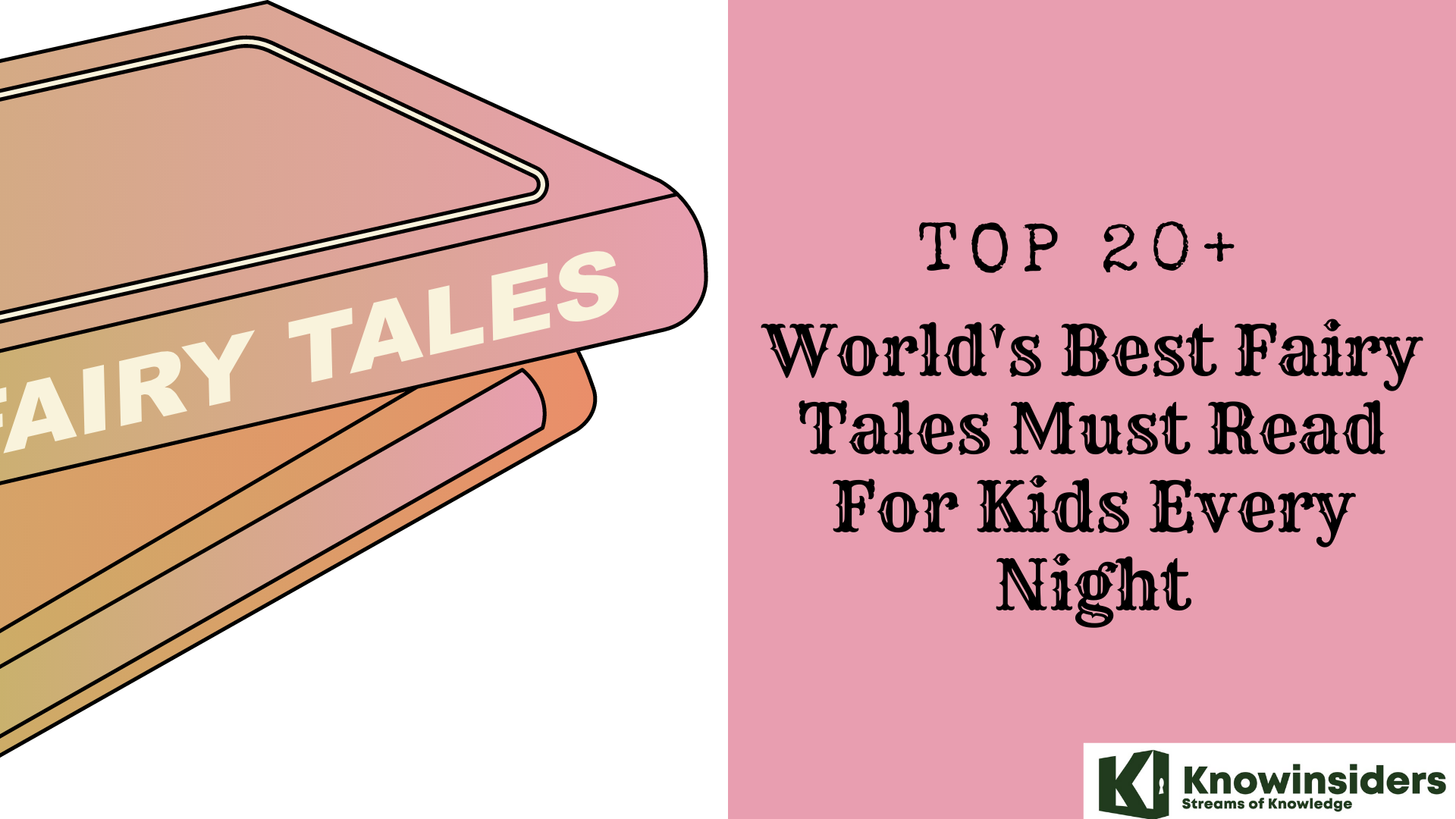 Top 20+ World's Best Fairy Tales (Full Text) Must Read For Kids Every Night Top 20+ World's Best Fairy Tales (Full Text) Must Read For Kids Every Night A good story is all kids need before their bedtime, and these best fairy tales will help your children fall to sleep much easier. |
 Top 20+ Best and High-Paying Jobs in the Future Top 20+ Best and High-Paying Jobs in the Future Here is the list of 20 emerging careers that are set to be the best and most high-paying in the near future! |
 Top 20+ Best Free Websites to Sell Stuff Online Anywhere in The World Top 20+ Best Free Websites to Sell Stuff Online Anywhere in The World It is much easier for you to make a living from your online ventures now. To help you start selling straight away, we’ve created this ... |
 Top 20+ Best Free Sites for Job Search and Posting Top 20+ Best Free Sites for Job Search and Posting Many job-posting sites will ask for a credit card to help with verifying you as a legitimate employer. So these 20 best free websites for ... |


























